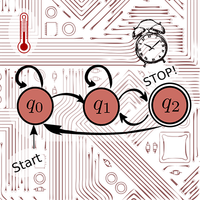Thermodynamics of Computations with Absolute Irreversibility, Unidirectional Transitions, and Stochastic Computation Times
IF 11.6
1区 物理与天体物理
Q1 PHYSICS, MULTIDISCIPLINARY
引用次数: 0
Abstract
Developing a thermodynamic theory of computation is a challenging task at the interface of nonequilibrium thermodynamics and computer science. In particular, this task requires dealing with difficulties such as stochastic halting times, unidirectional (possibly deterministic) transitions, and restricted initial conditions, features common in real-world computers. Here, we present a framework which tackles all such difficulties by extending the martingale theory of nonequilibrium thermodynamics to generic nonstationary Markovian processes, including those with broken detailed balance and/or absolute irreversibility. We derive several universal fluctuation relations and second-law-like inequalities that provide both lower and upper bounds on the intrinsic dissipation (mismatch cost) associated with any periodic process—in particular, the periodic processes underlying all current digital computation. Crucially, these bounds apply even if the process has stochastic stopping times, as it does in many computational machines. We illustrate our results with exhaustive numerical simulations of deterministic finite automata processing bit strings, one of the fundamental models of computation from theoretical computer science. We also provide universal equalities and inequalities for the acceptance probability of words of a given length by a deterministic finite automaton in terms of thermodynamic quantities, and outline connections between computer science and stochastic resetting. Our results, while motivated from the computational context, are applicable far more broadly.

具有绝对不可逆、单向转换和随机计算时间的计算热力学
发展计算的热力学理论是非平衡热力学与计算机科学交界处的一项具有挑战性的任务。尤其是,这项任务需要处理诸如随机停止时间、单向(可能是确定性)转换和受限初始条件等现实世界计算机中常见的难题。在这里,我们提出了一个框架,通过将非平衡热力学的马氏理论扩展到一般非平稳马尔可夫过程,包括那些细节平衡被打破和/或绝对不可逆的过程,来解决所有这些难题。我们推导出了几种通用波动关系和类似第二定律的不等式,它们为与任何周期性过程--尤其是当前所有数字计算所依赖的周期性过程--相关的内在耗散(失配成本)提供了下限和上限。重要的是,即使进程具有随机停止时间,这些界限也适用,许多计算机器就是如此。我们通过对处理比特串的确定性有限自动机(理论计算机科学的基本计算模型之一)进行详尽的数值模拟来说明我们的结果。我们还从热力学量的角度为确定性有限自动机接受给定长度单词的概率提供了通用等式和不等式,并概述了计算机科学与随机重置之间的联系。我们的结果虽然是在计算的背景下产生的,但适用范围更广。
本文章由计算机程序翻译,如有差异,请以英文原文为准。
求助全文
约1分钟内获得全文
求助全文
来源期刊

Physical Review X
PHYSICS, MULTIDISCIPLINARY-
CiteScore
24.60
自引率
1.60%
发文量
197
审稿时长
3 months
期刊介绍:
Physical Review X (PRX) stands as an exclusively online, fully open-access journal, emphasizing innovation, quality, and enduring impact in the scientific content it disseminates. Devoted to showcasing a curated selection of papers from pure, applied, and interdisciplinary physics, PRX aims to feature work with the potential to shape current and future research while leaving a lasting and profound impact in their respective fields. Encompassing the entire spectrum of physics subject areas, PRX places a special focus on groundbreaking interdisciplinary research with broad-reaching influence.
 求助内容:
求助内容: 应助结果提醒方式:
应助结果提醒方式:


